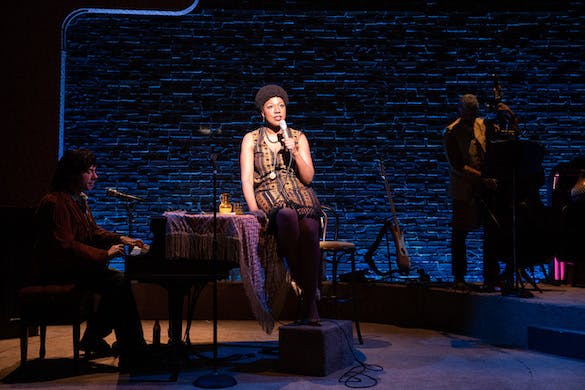Presenting Nina Simone, Now That the World Has Caught Up
Simone’s civil rights activism naturally looms large in Laiona Michelle’s ‘Little Girl Blue.’

The actress, singer, and writer Laiona Michelle began feeling a kinship with Nina Simone “when I kept hearing about it from the universe,” she says. Friends and colleagues would hear Ms. Michelle’s resonant contralto voice, and even listen to certain inflections in her speech, “and it would be like, ‘Whoa — do you sing any Nina?’”
It wasn’t just an affinity for the legendary musician’s material that propelled Ms. Michelle to create a show that pays homage to Simone. “To be direct, me writing about Nina came out of pure desperation,” Ms. Michelle says. Despite having performed on Broadway and at leading regional theaters, “I was feeling really frustrated with my career. So my agent encouraged me to start writing.”
The result, “Little Girl Blue,” opens off-Broadway at New World Stages on Monday, following acclaimed runs at New Brunswick’s George Street Playhouse and at Goodspeed by the River in East Haddam, Connecticut. The new musical re-imagines a pair of Simone’s most chronicled performances: at the Westbury Music Fair in April 1968, just days after Martin Luther King Jr. was assassinated, and at the Montreux Jazz Festival in Switzerland in 1976.
Ms. Michelle is joined onstage by three musicians — including her music director and arranger, Mark Fifer — who play band members based on Simone’s array of collaborators. The songs they perform reflect the breadth of the late artist’s repertoire and vision, ranging from the titular Rodgers and Hart standard to traditional songs, rock and R&B classics, and tunes by Jacques Brel, Judy Collins, and Randy Newman. There are also deep nods to Bach, whom the classically trained Simone refers to in the show as “my first love.”
In between numbers, Ms. Michelle’s Simone interacts with her colleagues — often affectionately, sometimes impatiently — and addresses the audience, evincing the many facets that defined the artist and activist. “Little Girl Blue” also delves into Simone’s personal struggles, exploring her complicated relationships with her parents and the husband who managed and abused her, and documenting the erratic behavior and nervous breakdowns that eventually led to her being prescribed antipsychotic medication.
“I did layer after layer of research,” Ms. Michelle says. “A lot of reading, a lot of listening. I had the chance to interview people who knew [Simone] personally, and to listen to musical selections that weren’t released, from when she was in the studio just cutting up. That gave me great insight into the woman on a personal level — how she addressed the musicians, whom she held to a very high standard.”
Simone’s civil rights activism naturally looms large in “Little Girl Blue.” Ms. Michelle alludes to her camaraderie with King and her travel to Africa, and demonstrates how she saw the label of jazz as a racist designation. She yearned to be recognized for her skills as a classical musician.
Ms. Michelle was unable to secure the rights to use “Mississippi Goddam” — the protest song that Simone wrote in response to the killing of four black girls at the 16th Street Baptist Church bombing in Birmingham, Alabama, while still seething over the murders of Emmett Till and Medgar Evers.
She was angry, but says, “I thought, like Nina, when you’re angry, you take that feeling and turn it into art. Not that I’m comparing my frustration to the grief she felt after those little girls were murdered — but I took my frustration and poured it into the show.”
Specifically, Ms. Michelle teamed with Mr. Fifer to write a new song for the musical, titled, “Angry Black Woman.”
“It was a creative way to pay respect to ‘Mississippi Goddam,’ and to uphold the integrity of the entire piece. I wanted to quiet all those voices around Nina Simone, people who identify her as being just an angry black woman. This show was my attempt to answer some of those questions, like, ‘Why was she angry? Why was she so deeply sad?’”
Ms. Michelle notes, “Fifty, sixty years ago, Nina was a foot soldier. She was doing a lot of heavy lifting. Her albums were being broken across the country, when she sang protest songs. The world wasn’t really ready for Nina. We hear the phrase ‘Black Lives Matter’ now; we hear about inclusion. Nina was saying that black lives matter then. This show, for me, is right on time.”

